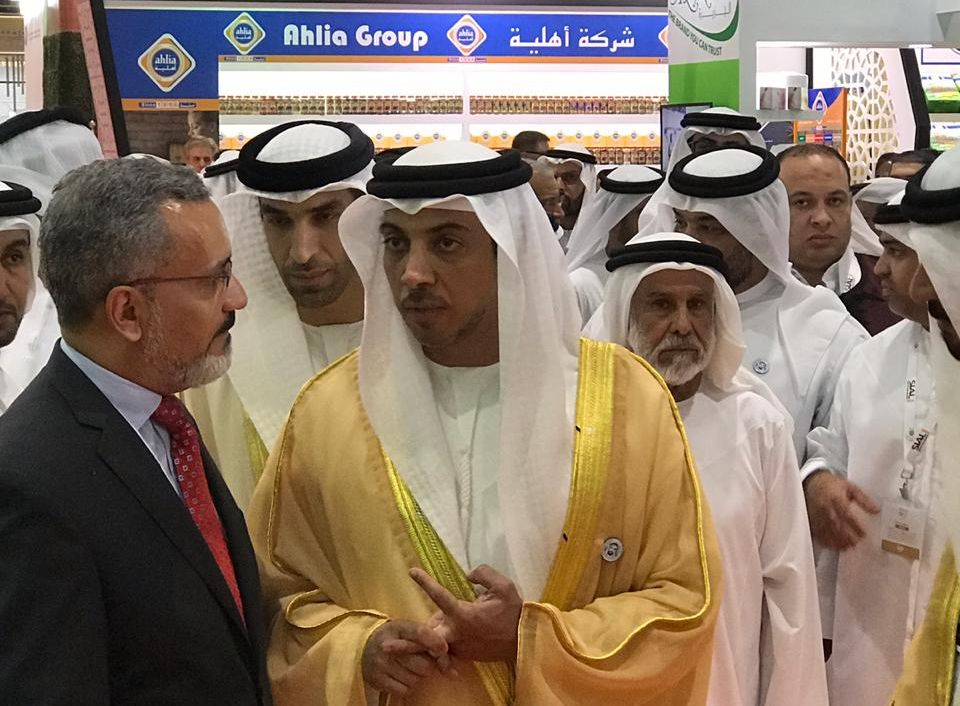Abu Dhabi – The United Arab Emirates intend to invest in Brazil’s agricultural private sector. Deputy prime minister sheikh Mansour bin Zayed Al Nahyan this Monday (10) spoke with the ambassador of Brazil to the UAE, Fernando Luís Lemos Igreja, while visiting the Brazilian stand at the food industry show SIAL Middle East, Nahyan unveiled the plaque marking the launch of the Brazilian space at the show, which features 14 exhibiting companies. Pictured above are Nahyan and Igreja.
Nahyan said the UAE are interested in Brazilian food production, which his country needs. He also mentioned distributing the items in other regions. According to Igreja, Nahyan expressed a keen interest in partnering up with private sector players. Brazil and the UAE are in talks for an investment facilitation agreement that might come to fruition in 2019 during the visit of an UAE official to Brazil, which is yet to be confirmed according to Igreja. The agreement is expected to fuel investment.

The ambassador believes the Arab country might be interested in sectors including meats, soy and fruits. Igreja sees much potential in these relations. One of the factors is the chance the UAE might act as a hub for shipping out Brazilian product to regions such as Asia and the East Coast of Africa.
Igreja claims that talks for the investment facilitation deal are at a very advanced stage, and that whatever major obstacles facing it have already been overcome. “The question is to wait for the right moment,” he says regarding the signature of the agreement, which the ambassador believes will increase mutual trust for investors in the UAE and Brazil.
According to the diplomat, Brazil is a major supplier of foods to the UAE. According to data from Brazil’s Ministry of Industry, Foreign Trade and Services compiled by the Arab Brazilian Chamber of Commerce, USD 1.8 billion in food items got shipped from Brazil to the UAE from January to November 2018, especially poultry, sugar, ore and beef. Brazil imported USD 458 million in goods from the UAE, with fuels and fertilizers making up the bulk of sales.
“Brazil is regarded by the UAE as a great source of foods, a crucial part of their food security,” said Igreja. The ambassador said the Arab country also recognizes Brazil’s status as a relevant player in international relations.
Igreja believes this is a great time for Brazil-UAE bilateral relations. He mentions the visa waiver which became effective this year, the signature of an anti-double taxation agreement – also in 2018 – and ongoing negotiations for investment facilitation and other agreements, including legal cooperation, triangular deals (involving third-party countries) and extradition treaties. “The entry into force of the visa waiver was a watershed,” said Igreja.
Last July saw the first-ever meeting of a Brazil-UAE political consultations mechanism. October saw the UAE welcome Brazil’s minister of Agriculture, Livestock and Supply Blairo Maggi at the Agriscape show in Abu Dhabi. Former Brazilian president Fernando Collor de Mello travelled to the UAE in the capacity of chairman of the Federal Senate’s Commission on Foreign Relations. “It has been a very fruitful year when it comes to contacts and advancing relations,” the ambassador told ANBA.

Besides working for Brazil-UAE ties in politics and trade, the Embassy hosted several events for the Brazilian community in the country – which is estimated as comprising about 10,000 people. “It’s a participative, active, close-knit, involved community,” Igreja said. The Embassy also worked to feature Brazil in the local cultural scene. In November, Reco do Bandolim and the Choro Livre group played a show organized by the Embassy in Abu Dhabi. Igreja wants to keep doing this kind of work in 2019. “To show them how rich our culture is,” he said.
Preparations are underway for Brazil’s stint in Expo 2020, the world exhibition Dubai will host from October 2020 to April 2021. Igreja notes that the design of Brazil’s pavilion has been completed, and that more and more work will be done until the exhibition begins.
According to Igreja, plans for 2019 also include increasing Brazil-UAE trade – which slumped in 2018 due to a drop in sugar prices; having an Emirati authority visit Brazil; and the signing of the agreements currently in discussion. “In the meantime, we will keep going with our cultural activities, the support of the Embassy, of the Brazilian Foreign Ministry and of Apex-Brasil to the Brazilian private sector,” he said, while highlighting the Arab Chamber’s work: “A constant partner,” said Igreja.
Translated by Gabriel Pomerancblum




